Cross-cultural adaptation and validation of the Chinese version of the Malnutrition Awareness Scale among community-dwelling older adults
IF 2.5
3区 医学
Q3 GERIATRICS & GERONTOLOGY
引用次数: 0
Abstract
Objective
To translate, cross-culturally adapt, and validate the Malnutrition Awareness Scale (MAS) among Chinese community-dwelling older adults.
Methods
This study consists of two parts. First, we developed the Chinese version of the MAS (C-MAS) through direct translation, back translation, cross-cultural adaptation, and pilot testing. Then, we selected 380 community-dwelling older adults from two community healthcare centers in Zhengzhou from May to July 2024 for a questionnaire survey to assess the scale's reliability and validity, including internal reliability, test-retest reliability, split-half reliability, content validity, and construct validity.
Results
The C-MAS included 4 dimensions and 23 items. At the scale level, the content validity index (S-CVI) was 0.91; at the item level, the content validity ranged from 0.86 to 1.00. The exploratory factor analysis (EFA) extracted four common factors with factor loads of 0.646 to 0.893 for each item, and the cumulative variance contribution rate was 71.418%. The confirmatory factor analysis (CFA) indicated a satisfactory fit for each indicator. The Cronbach's alpha coefficient for this scale was 0.908, with test-retest reliability of 0.952 and split-half reliability of 0.738.
Conclusion
The reliability and validity of C-MAS are up to standard and can be used to assess malnutrition awareness among Chinese community-dwelling older adults.
社区老年人营养不良意识量表中文版的跨文化适应与验证
目的对中国社区老年人营养不良意识量表(MAS)进行翻译、跨文化适应和验证。方法本研究分为两部分。首先,我们通过直接翻译、回译、跨文化改编和试点测试,开发了MAS的中文版(C-MAS)。然后,我们于2024年5月至7月选取郑州市两家社区卫生保健中心的380名社区居住老年人进行问卷调查,对量表的信度和效度进行评估,包括内部信度、重测信度、分半信度、内容效度和结构效度。结果C-MAS包括4个维度23个项目。量表水平上,内容效度指数(S-CVI)为0.91;在项目水平上,内容效度在0.86 ~ 1.00之间。探索性因子分析(EFA)提取了4个共同因子,每个项目的因子负荷为0.646 ~ 0.893,累积方差贡献率为71.418%。验证性因子分析(CFA)表明每个指标都符合要求。该量表的Cronbach’s alpha系数为0.908,重测信度为0.952,分半信度为0.738。结论C-MAS的信度和效度均符合标准,可用于评价我国社区老年人的营养不良意识。
本文章由计算机程序翻译,如有差异,请以英文原文为准。
求助全文
约1分钟内获得全文
求助全文
来源期刊

Geriatric Nursing
医学-护理
CiteScore
3.80
自引率
7.40%
发文量
257
审稿时长
>12 weeks
期刊介绍:
Geriatric Nursing is a comprehensive source for clinical information and management advice relating to the care of older adults. The journal''s peer-reviewed articles report the latest developments in the management of acute and chronic disorders and provide practical advice on care of older adults across the long term continuum. Geriatric Nursing addresses current issues related to drugs, advance directives, staff development and management, legal issues, client and caregiver education, infection control, and other topics. The journal is written specifically for nurses and nurse practitioners who work with older adults in any care setting.
 求助内容:
求助内容: 应助结果提醒方式:
应助结果提醒方式:


